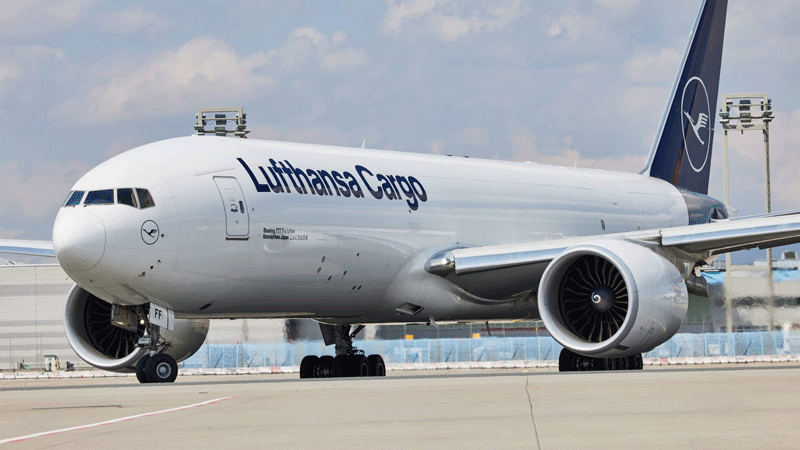In the financial year 2022, Lufthansa Cargo once again exceeded its result from the previous year. Revenue rose by 22 percent to 4.6 billion euros (previous year: 3.8 billion euros), while adjusted EBIT amounted to 1.6 billion euros (previous year: 1.5 billion euros). Overall, sales of 7.2 billion freight ton kilometers were similar compared to the previous year (7.2 billion). Average capacity utilization decreased by 9.9 percentage points year-on-year to 61.1 percent, while the supply of capacity increased by 17 percent to 11.8 billion freight ton kilometers offered.
"In the past fiscal year, we achieved a record result for the third time in a row. We owe this to the high level of commitment of our employees and the trust of our customers and partners. In addition, we again had significantly more capacity in the market due to the growth in long-haul passenger traffic. We notice that our customers continue to serve their global supply chains. With more freighters and more bellies, we will continue to be a strong and reliable partner for our customers," said Dorothea von Boxberg, Chairperson of the Executive Board and CEO of Lufthansa Cargo.
While the flight program of passenger airlines was suspended or maintained only on a small scale during the Corona pandemic, numerous cargo capacities in the bellies of these aircraft were temporarily unavailable for the transport of goods. With the resumption of numerous passenger flights, both capacity and route offerings expanded. This strong growth trend in the belly segment continues today and now accounts for around half of Lufthansa Cargo's transport capacities. In the 2023 summer flight schedule alone, cargo will be regularly transported on more than 7,000 flights a week operated by Lufthansa, Austrian Airlines, Brussels Airlines, Eurowings Discover and SunExpress.
"We are looking ahead to the fiscal year of 2023 with confidence. The environment remains dynamic. But we are convinced that we are excellently positioned and can respond flexibly and quickly to changes in the market. We are consistently pursuing our successful strategy. We are expanding our digital services and offering our customers more and more sustainable solutions. We will also be successful in 2023," adds Dorothea von Boxberg.
Lufthansa Cargo's fiscal year 2022 was marked by groundbreaking investments to expand the freighter fleet. It currently consists of 16 Boeing 777Fs and two Airbus A321Fs. To further expand the capacity of its long-haul fleet, Lufthansa Cargo is relying on Boeing's efficient twin-aisle aircraft and ordered three B777Fs of the current technology and seven B777-8Fs of the next Boeing freighter generation. One B777F has already been delivered in the past fiscal year, enabling Lufthansa Cargo to increase frequencies to high-demand intercontinental destinations such as in China and India and to open a new freighter station in Hanoi, Vietnam. Alongside North and South America, the Asia-Pacific region is one of Lufthansa Cargo's strongest markets. With the additional entry into service of two Airbus freighters of the type A321F in 2022, Lufthansa Cargo was able for the first time to offer fast transport solutions on short and medium-haul routes for customers from the rapidly growing eCommerce segment. Two additional Airbus freighters will supplement the fleet from summer 2023, increasing capacities on intra-European routes.
The investments also further support Lufthansa Cargo in reaching its sustainability goals: Lufthansa Cargo is sticking to its plan to become CO2-neutral by 2050 and is aiming for an important first milestone on the way by halving CO2 emissions by 2030. Operating freighter flights with Sustainable Aviation Fuels remains the focus. The service offer "Sustainable Choice" enables customers to transport their freight in a CO2-neutral manner. In handling, Lufthansa Cargo has also been using an environmentally friendly plastic film to protect cargo during transport since fall 2022. This film is thinner and lighter, thus saving weight and volume consumption. In addition, aircraft in the fuel-efficient B777 freighter fleet will gradually be equipped with the innovative surface technology AeroSHARK from BASF and Lufthansa Technik from the beginning of 2023. A special film optimizes the flow pattern on the fuselage and engine nacelles during flight, which in turn saves fuel and reduces emissions. Lighter yet tear-resistant transport nets for cargo pallets have also been in use since January. They are made from renewable raw materials and weigh over 50 percent less than conventional nets. The associated weight savings thus make a further important contribution to reducing CO2 emissions on flights.
In the area of digitalization, Lufthansa Cargo succeeded in 2022 in expanding digital sales channels and making handling processes more efficient thanks to improved data quality and use. This benefits partners and customers alike in the transport chain. With Mobile Digital Handling, digital solutions are increasingly replacing paper-based processes. In addition, 100 percent of all shipments were transported with an electronic air waybill (eAWB) for the first time last year.









